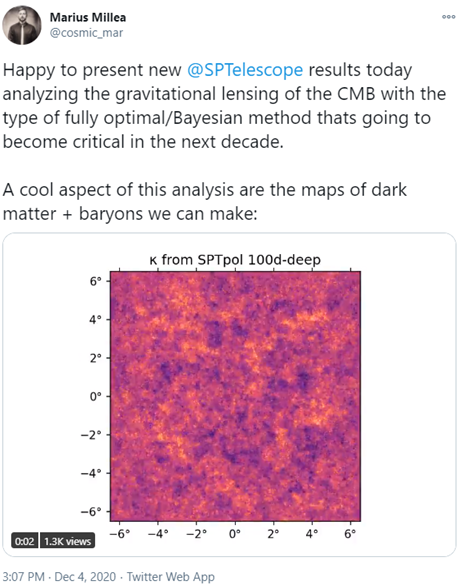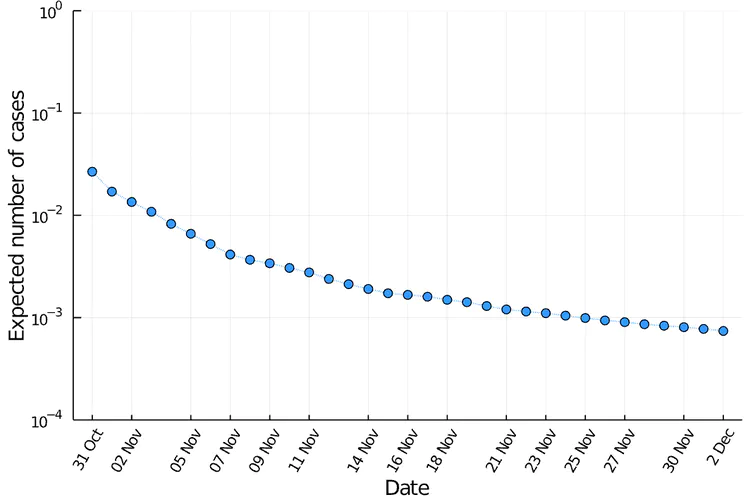Newsletter January 2021 - Jan 2021 Julia Growth Indicators
Julia adoption accelerated at a rapid pace in 2020.
| Total Cumulative as of Jan 1, 2020 | Total Cumulative as of Jan 1, 2021 | Change | |
| Number of Julia Downloads (JuliaLang + Docker + JuliaPro) | 12,950,630 | 24,205,141 | +87% |
| Number of Julia Packages | 2,787 | 4,809 | +73% |
| GitHub stars (Julia language repo + registered packages) | 99,830 | 161,774 | +62% |
| YouTube views (Julia language channel) | 1,562,223 | 3,320,915 | +113% |
| Published citations of Julia: A Fast Dynamic Language for Technical Computing (2012) + Julia: A Fresh Approach to Numerical Computing (2017) | 1,680 | 2,531 | +51% |
| Discourse posts | 137,399 | 211,888 | +54% |
| TIOBE Index Rank | #47 | #23 | +24 |
Julia Rises from #47 to #23 in TIOBE Index: According to TIOBE CEO Paul Jansen, “The top candidate [to break into the top 20 in 2021] is without doubt Julia, which jumped from position 47 to position 23 in the last 12 months.” Among languages developed on GitHub, Julia ranks #7 in stars and #9 in forks. Julia also ranks #24 in the PYPL Index and #19 in the IEEE Spectrum ranking.
-
DevClass: “Those more interested in hot languages of the future should keep an eye on dynamic programming language Julia, which is currently gaining followers amongst researchers doing scientific or numerical computing. According to Jansen, a jump from position 47 to 23 in the last 12 months makes it top candidate for an entry into the top 20 of the list and maybe even staying there.”
-
ZDNet: “TIOBE also predicts that Julia, a programming language with roots in MIT, will become a top 20 language in 2021. Julia has only been available since 2012 but made it to TIOBE's top 50 in August 2018. Julia was created for tasks in scientific computing, machine learning, data mining, large-scale linear algebra, distributed, and parallel computing. It aims for the speed of C but to be as useful for general programming as Python.”
-
SD Times: “TIOBE predicts Julia, Dart and Rust will reach the top 20 this year.”
-
TechRepublic: "’Are there any new top 20 entries to be expected in 2021? Top candidate is without doubt Julia, which jumped from position 47 to position 23 in the last 12 months. Dart and Rust are other candidates, but both of them touched the top 20 already without being able to stay for a longer time,’ said Jansen in a blog post.”
Synced - 2020 in Review with Viral Shah: Synced published a 2020 Review with Julia co-creator and Julia Computing co-founder and CEO Viral Shah, including scientific machine learning, differentiable programming and NeuralSim.
JuliaCon 2021 - Save the Date: Building on the massive success of JuliaCon 2020 (more than 30,000 online participants from over 115 countries), JuliaCon 2021 will be free and online from July 28-30. More information, including registration, will be available soon.
Accelerated Predictive Healthcare Analytics with Pumas, a High Performance Pharmaceutical Modeling and Simulation Platform: Chris Rackauckas et al. published a new paper about Pumas.jl, the Julia-based end-to-end solution for pharmacology and pharmacometrics, including drug development, testing and dosing. Pumas.jl is free for educational and non-commercial use, and available commercially for everyone else. Please contact sales@juliacomputing.com for more information.
Free Webinars from Julia Computing: Register today to participate in a free Webinar from Julia Computing. Each free Webinar is one hour and is presented by a Julia Computing expert.
| Webinar | Presenter | Length of Webinar | Date | Time | Registration Link | Cost |
| GPU Programming in Julia | Dr. Tim Besard, Julia Computing | 1 hour | Fri Jan 22 | 12 noon - 1 pm Eastern (US) | Register | Free |
| PackageCompiler and Static Compilation in Julia | Kristoffer Carlsson, Julia Computing | 1 hour | Fri Jan 29 | 12 noon - 1 pm Eastern (US) | Register | Free |
| Pumas-NLME - Integrated, Efficient, and Scalable Pharmacometric Workflows | Dr. Vijay Ivaturi, Pumas-AI Chief Scientific Officer | 1 hour | Fri Mar 5 | 12 noon - 1 pm Eastern (US) | Register | Free |
Live Instructor-Led Online Julia Training from Julia Computing: Register today for Introduction to Julia, Introduction to Machine Learning and Artificial Intelligence in Julia and Parallel Computing in Julia. All three courses consist of 8 hours of live instruction online from Dr. Matt Bauman, Julia Computing Director of Applications Engineering.
| Course | Instructor | Length of Course | Day 1 | Day 2 | Registration Link | Cost |
| Introduction to Julia | Dr. Matt Bauman, Julia Computing Director of Applications Engineering | 8 hours | Thursday Feb 11 11 am - 3 pm Eastern (US) | Friday Feb 12 11 am - 3 pm Eastern (US) | Register | $250 USD |
| Introduction to Machine Learning and Artificial Intelligence in Julia | Dr. Matt Bauman, Julia Computing Director of Applications Engineering | 8 hours | Thursday Mar 11 11 am - 3 pm Eastern (US) | Friday Mar 12 11 am - 3 pm Eastern (US) | Register | $500 USD |
| Parallel Computing in Julia | Dr. Matt Bauman, Julia Computing Director of Applications Engineering | 8 hours | Thursday Apr 8 11 am - 3 pm Eastern (US) | Friday Apr 9 11 am - 3 pm Eastern (US) | Register | $500 USD |
Cosmologists Use Julia to Analyze Gravitational Lensing: Cosmologist Marius Millea presented results from the South Pole Telescope using Julia to analyze gravitational lensing of the Cosmic Microwave Background.

Julia for Modeling Turbulence: Jean-Christophe B. Loiseau shared images and code from his model of decaying turbulence: “Computation of the Navier-Stokes equations takes less than 50 lines of code, including blank lines and my (numerous) comments and is still super readable. I'll definitely use it from my numerical methods class! Given how fast it runs on my 6 years-old laptop and how easily it can be integrated with tools such as Flux.jl, I may also use it to explore crazy ideas combining nonlinear simulations, optimization and machine learning to identify coherent structures in 2D turbulence :)” Nima Dehghani adds: “This is a testament to the elegance of Julia. I also just finished a series of [an] insane number of calculations (millions of diffusion on networks+MC sampling) [that] took 2 weeks with Julia (64 core machine w RTX GPU). On python, a fraction of it took 1 month. Thanks @JuliaLanguage ![]()

JuliaHub from Julia Computing: As you may know, JuliaHub is the easiest way to scale large distributed Julia jobs using the cloud. Now JuliaHub also allows you to develop Julia applications interactively, using an online browser based IDE, or by using the Pluto notebook environment. Hosted on the cloud and paid by the minute, JuliaHub is the easiest way to get started with Julia development or share your work with dashboards and notebooks.
Converting from Proprietary Software to Julia: Are you looking to leverage Julia’s superior speed and ease of use, but limited due to legacy software and code? Julia Computing and our partners can help accelerate replacing your existing proprietary applications, improve performance, reduce development time, augment or replace existing systems and provide an extended trusted team to deliver Julia solutions. Leverage experienced resources from Julia Computing and our partners to get your team up and running quickly. For more information, please contact us.
Julia Computing Enterprise Products
-
JuliaHub: JuliaHub from Julia Computing provides a seamless experience for Julia users to manage their packages, find documentation, make open source contributions and run large compute-intensive workloads. Click here for more information.
-
JuliaSure: JuliaSure from Julia Computing provides full service development support, production support and indemnification for companies using Julia. Subscriptions are USD $99 per month. Click here to subscribe.
-
JuliaTeam: JuliaTeam from Julia Computing lets your entire enterprise work together using Julia. Collaborate, develop and manage private and public packages across your organization, manage open source licenses and benefit from continuous integration, deployment, security, indemnity and enterprise governance. Click here for more information.
-
Pumas: Pumas from Julia Computing and Pumas.ai is a comprehensive platform for pharmaceutical modeling and simulation, providing a single tool for the entire drug development pipeline. Click here for more information.
MIT Julia Lectures Garner 850 Thousand Cumulative Views on YouTube: MIT’s Computational Thinking course lectures are available for free on YouTube. Instructors include Grant Sanderson, Alan Edelman, David Sanders, James Schloss, Huda Nasser, Ali Ramadhan, John Urschel and Henri Drake. The most viewed lectures include:
-
Convolutions in Image Processing (Grant Sanderson) - 242,414 views
-
The Diffusion Equation (Grant Sanderson) - 105,373 views
-
What Is a Discrete Fourier Transform? (Grant Sanderson) - 102,795 views
Julia Used to Infer that Victoria (Australia) is COVID-Free: Michael Stumpf (University of Melbourne) uses Julia to infer that Victoria (Australia) is free of COVID-19.

Google Introduces New Version of TPU Stack: At JuliaCon 2019, Julia Computing Co-Founder Keno Fischer identified a major pain point facing TPU users. This year, Google announced a new version of the TPU stack that eliminates this issue and makes using TPUs easier.

GeoStats.jl Survey: The GeoStats.jl community is conducting a short 6 question survey to better understand GeoStats.jl users. Please click here to participate.
Stipple for Julia App Development: Stipple is a new tool to help you develop, deploy and scale Julia applications. Beta registration is open now.
Slowing the Spread of COVID-19: MIT researchers Raj Dandekar, Chris Rackauckas, Emma Wang and George Barbastathis developed a model designed to help slow and stop the spread of COVID-19. More information is available here.
Julia and Julia Computing in the News
-
Synced: 2020 in Review with Viral B. Shah
-
EETimes: Meet the Man Bridging Data Science & Big Data Systems
-
Tech Target: How to Structure and Manage a Data Science Team
-
ReadWrite: Top 10 Programming Languages to Become an AI Developer
-
VentureBeat: 9 Trends in Enterprise Database Technology
-
MIT News: Slowing the Spread of Covid-19
-
Tech Republic: Python Named TIOBE's 2020 Top Programming Language, But C Tops the January Index
-
Extreme Tech: Beyond Zoom: Virtual Gathering Spaces for the Holidays and Beyond
-
ZDNet: Programming Languages: Python Rules While Java Dips
-
SD Times: Python Named TIOBE’s Programming Language of 2020
-
Dev Class: Fourth Time’s the Charm: TIOBE Declares Python Programming Language of 2020
-
I-Programmer: Season Of Docs 2020 - A Success Story
Julia Blog Posts
-
Dissecting RANDU (Bogumił Kamiński)
-
DataFrames.jl Minilanguage Explained (Bogumił Kamiński)
-
Is Case_When Needed in DataFrames.jl? (Bogumił Kamiński)
-
Binning Your Data with Julia (Bogumił Kamiński)
-
DataFrames 0.22 @ JuliaAcademy (Bogumił Kamiński)
-
Sets, Chains and Rules - Part I (Mathieu Besançon)
-
Sets, Chains and Rules - Part II (Mathieu Besançon)
-
Experiments on Communicating Vessels, Constrained Optimization and Manifolds (Mathieu Besançon)
-
Julia, Julia, Julia (Matt Roughan)
-
CFD Tutorial in Julia (Emad Masroor)
-
Constraint Solver: Priority Queue (Ole Kröger)
-
E-Graph Pattern Matching (Part II) (Philip Zucker)
-
Advent of Code 2020 Retrospective (Dheepak Krishnamurthy)
Upcoming Julia Online Events
-
Online Meetup: SymPy.jl and Symata.jl with Boulder Data Science, Machine Learning and AI Jan 14
-
Online Meetup: C-Sets for Data Analysis: Relational Data and Conjunctive Queries in Julia with Category Theory and Applications Jan 20
-
Webinar: GPU Programming with Dr. Tim Besard (Julia Computing) Jan 22
-
Webinar: Package Compiler and Static Compilation in Julia with Kristoffer Carlsson (Julia Computing) Jan 29
-
Online Meetup: Differential Equations in Julia with Stuttgart Julia Programming Language Meetup Feb 6
-
Online Training: Introduction to Julia with Dr. Matt Bauman (Julia Computing) Feb 11-12
-
Webinar: Pumas-NLME - Integrated, Efficient, and Scalable Pharmacometric Workflows with Dr. Vijay Ivaturi (Pumas-AI) Mar 5
-
Online Training: Introduction to Machine Learning and Artificial Intelligence Using Julia with Dr. Matt Bauman (Julia Computing) Mar 11-12
-
Online Training: Parallel Computing Using Julia with Dr. Matt Bauman (Julia Computing) Apr 8-9
-
Virtual Conference: JuliaCon 2021 Jul 28-30
Recent Julia Online Events
-
Webinar: Quantitative Systems Pharmacology Using Pumas with Dr. Matt Bauman (Julia Computing) Dec 4
-
Webinar: High Performance Computation (HPC) on JuliaHub with Dr. Matt Bauman (Julia Computing) Dec 8
-
Webinar: Financial Modeling on Large Streaming Datasets with Dr. Josh Day (Julia Computing) Dec 10
-
Online Meetup: Julia DataFrames with Konstantino Michailidis and Julia User Group Freiburg Dec 15
-
Online Meetup: Julia for R Users with Dr. Paul Palmes, Kevin O’Brien and Dublin R Dec 17
-
Online Meetup: Getting Involved with Julia Org the Open Source Way with Logan Kilpatrick, Kunal Kushnawa and Code for Cause Jan 8
Julia Jobs, Fellowships and Internships There are hundreds of Julia jobs currently listed on Indeed.com and JuliaLang Discourse. Do you work at or know of an organization looking to hire Julia programmers as staff, research fellows or interns? Would your employer be interested in hiring interns to work on open source packages that are useful to their business? Help us connect members of our community to great opportunities by sending us an email, and we'll get the word out.
Contact Us: Please contact us if you wish to:
-
Purchase or obtain license information for Julia Computing products such as JuliaHub, JuliaSure, JuliaTeam or Pumas
-
Obtain pricing for Julia consulting projects for your organization
-
Schedule online Julia training for your organization
-
Share information about exciting new Julia case studies or use cases
-
Spread the word about an upcoming online event involving Julia
-
Partner with Julia Computing to organize a Julia event online
-
Submit a Julia internship, fellowship or job posting
About Julia and Julia Computing
Julia is the fastest high performance open source computing language for data, analytics, algorithmic trading, machine learning, artificial intelligence, and other scientific and numeric computing applications. Julia solves the two language problem by combining the ease of use of Python and R with the speed of C++. Julia provides parallel computing capabilities out of the box and unlimited scalability with minimal effort. Julia has been downloaded by users at more than 10,000 companies and is used at more than 1,500 universities. Julia co-creators are the winners of the 2019 James H. Wilkinson Prize for Numerical Software and the 2019 Sidney Fernbach Award. Julia has run at petascale on 650,000 cores with 1.3 million threads to analyze over 56 terabytes of data using Cori, one of the ten largest and most powerful supercomputers in the world.
Julia Computing was founded in 2015 by all the creators of Julia to develop products and provide professional services to businesses and researchers using Julia.
About the Author

JuliaHub
Discover key content authored by JuliaHub experts. Stay updated on innovative practices in scientific and technical computing.


.jpg)
